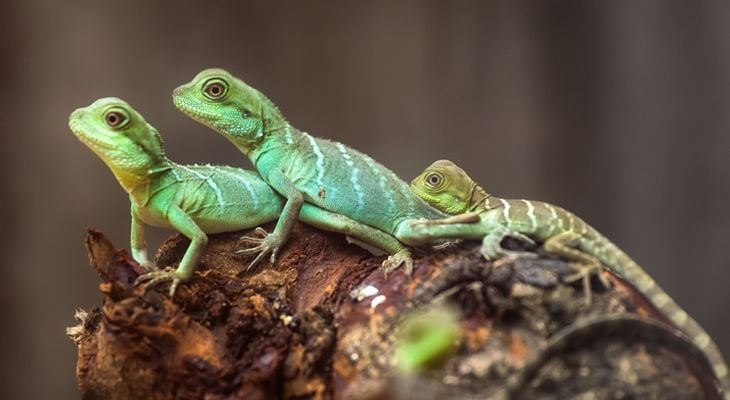Not sure if you should leave your pet in the car? The answer to this question is always the same.
Read more

People with limited living quarters may find that reptiles such as lizards or turtles fit perfectly into their lifestyles. Before deciding on a reptile, learn as much as possible about them and their needs. Poisonous snakes and certain reptiles should never be kept as pets. Ask your veterinarian about the suitability of a particular animal before you make your decision. There are many things to consider before committing to a reptile as a pet.
Finding out if a Pet is Legal Where You Live
Many areas have enacted laws pertaining to keeping reptiles. Some are general and some are quite specific; in many places any reptiles that are considered dangerous (venomous snakes, alligators, etc.) are illegal but some places are even more restrictive (for example, in some states all constricting snakes including ball pythons are illegal).
Salmonella Risks and Prevention
All reptile owners need to be informed about Salmonella infections. While the risks shouldn't keep most people from keeping reptiles since with the proper management the risks are minimal. Still, owners should be aware of the risks, and the US Centers for Disease Control recommends that certain risk groups should be careful about contact with reptiles and amphibians.
The Importance of Light and Heat
Many problems with keeping reptiles can be traced back to not providing the proper environmental conditions, particularly heat. Proper lighting is also important for many reptiles. The equipment to provide the proper heat and light to captive reptiles is often quite expensive, but is absolutely essential to keeping pet reptiles healthy. It is important to find out exactly what conditions your reptile needs and never cut corners when it comes to meeting those conditions!
Why Choose Captive Bred Reptiles
There are numerous reasons why you should pick a captive bred reptile if at all possible, as explained here.
How to Pick a Healthy Reptile
It is important to keep in mind that depending on where you get a reptile, it may be very stressed, dehydrated, and prone to illness. Here are some items to look for when buying your reptile to increase the chances of picking out a healthy pet reptile.
While there are many types of reptiles that could be good pets, here we cover a few you could consider.
-
Can I Leave My Pet in the Car?
-
Lost Pets
Has your pet wriggled their way through the fence or dashed out the front door? When searching for your lost pet, make sure you include these steps in your hunt.
Read more -
Should You Leave Your Cat Alone for a Long Weekend?
So you have a trip planned for the weekend, but what should you do with your cat? Learn how to best care for your cat while you're away.
Read more -
Flea and Tick Season
Want to protect your pet from fleas and ticks? These tips can help.
Read more -
Summer Grooming Tips
Want to keep your pet cool and comfortable this summer? A few changes to your normal grooming routine can help.
Read more -
Tips for Traveling With Your Pet
Do you dread hitting the road with your pet? These tips may make the trip more comfortable and enjoyable for you both.
Read more -
6 Questions to Ask At Your Senior Pet's Next Check Up
Want to keep your senior pet healthy and happy? Ask these six questions at your pet's next check up.
Read more -
Pet Clothes: A Fashion Statement or a Necessity?
There is nothing cuter than a pet in a colorful sweater, but do our furry friends really need to wear clothing? Although clothing is not a necessity for every pet, some animals benefit from a little extra protection during cold or damp days. Others enjoy wearing festive clothing during holidays or other
Read more -
Put Some Teeth Into Your Pet’s Dental Care
According to the American Animal Hospital Association, nearly two-thirds of pets suffer from dental problems because their owners do not provide dental care for them. Imagine what would happen to your own teeth if they were never brushed or examined by a dentist. The same thing can happen with your pet’s
Read more -
Is a Wet Nose a Sign of a Healthy Pet?
Have you ever heard that a wet nose is a sign that your pet is healthy? Although that's often the case, it's not always true. A moist nose can benefit your pet in several ways, but it doesn't necessarily guarantee good health. How Does a Wet Nose Help My Pet? Have you ever been woken at 5 a.m. by a cold,
Read more -
Obesity and Diabetes in Pets
Think diabetes only affect people? Overweight pets may be at risk too.
Read more -
National Heartworm Awareness Month Focuses Attention on a Potentially Deadly Disease
Heartworm disease can have a devastating effect on your pet's health. National Heartworm Awareness Month, observed annually in April, reminds pet owners about the health dangers this preventable disease poses for pets. What Are Heartworms? Thin, white heartworms look like cooked pieces of spaghetti.
Read more -
Keep Your Pets Calm During the Holiday Season with These Tips
Although the holidays may be an exciting time of the year for you, your pets may find the festivities a little overwhelming. Even normally well-behaved pets can experience a little anxiety when their usual routines are disrupted. These tips will help you ensure that your furry friends truly enjoy the
Read more -
Pet Hearing Loss
Many of the same health problems that affect us, including hearing loss, also affect our pets. Fortunately, most pets adapt very well to the disability with a little help from their owners. What Causes Hearing Loss in Pets? Some pets are born deaf or hard of hearing, while others develop hearing loss
Read more -
5 Common Myths About Pets
Do cats really have nine lives? Find out if these and other pet myths are true.
Read more -
3 Reasons Why Your Pet Could Be Coughing
Wondering why your pet is coughing? Check out three common reasons.
Read more

